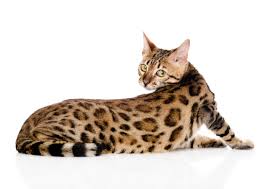
Bengal
Conditions of detention
Bengals are active cats that thrive in environments where they have plenty of space to explore and play. They require mental and physical stimulation and benefit from having access to climbing trees, interactive toys, and puzzle feeders. Bengals are well-suited to homes that can provide plenty of enrichment and interaction.
Useful Fact:
Bengals have a reputation for being energetic and are known to enjoy water. Providing them with interactive water toys or a safe way to play with water can be a great form of entertainment.
Nutrition and diet
Bengal cats require a balanced diet rich in protein to support their active lifestyle and muscular build. High-quality commercial cat food, either wet or dry, is recommended, and some owners opt for raw diets after consulting with a veterinarian.
Useful Fact: Bengals tend to prefer a high-protein diet due to their high energy levels and active nature.
Health
Bengal cats are generally healthy, but they can be prone to certain genetic conditions such as hypertrophic cardiomyopathy (HCM) and progressive retinal atrophy (PRA). Regular veterinary check-ups are essential to monitor their health.
Useful Fact: Regular heart and eye screenings are recommended for Bengals to detect potential health issues early.
Grooming and care
Bengal cats have a short, dense coat that requires minimal grooming. Weekly brushing helps remove loose hair and keeps their coat shiny. They are also known for grooming themselves frequently.
Useful Fact: Bengals have a unique pelt-like fur that often feels softer and silkier than other cat breeds.
Education and training
Bengal cats are highly intelligent and can be trained to perform various tricks and commands. They respond well to positive reinforcement techniques such as treats and praise.
Useful Fact: Bengals can be trained to walk on a leash and enjoy exploring the outdoors safely.
Toys and entertainment
Bengal cats are energetic and playful, needing a variety of toys to keep them stimulated. Interactive toys, puzzle feeders, and climbing structures are ideal to keep them entertained.
Useful Fact: Bengals enjoy interactive play with their owners and can play fetch like a dog.
Safety
Bengal cats are curious and adventurous, so it’s important to provide a safe environment. They should be kept indoors or in a secure outdoor enclosure to prevent accidents or escapes.
Useful Fact: Providing cat trees and shelves can help satisfy their climbing instincts and keep them engaged.
Accessories
Bengal cats benefit from various accessories, including scratching posts, cozy beds, and climbing trees. Interactive feeders and toys also help keep them mentally stimulated.
Useful Fact: Bengals enjoy high vantage points, so providing tall cat trees can make them feel secure and happy.
Socialization
Bengal cats are social animals that enjoy interacting with humans and other pets. Early socialization helps them develop well-rounded personalities and reduces behavioral issues.
Useful Fact: Bengals often form strong bonds with their owners and can follow them around the house like a loyal companion.
Travel and Transportation
When traveling with a Bengal cat, ensure their comfort and safety with a well-ventilated carrier, familiar blankets, and regular breaks during long trips to reduce stress.
Useful Fact: Bengals can adapt to travel more easily if they are exposed to it from a young age.
Behavior and psychology
Bengal cats are known for their lively and curious nature. They need regular mental and physical stimulation to prevent boredom and destructive behavior. Interactive play and training can help channel their energy positively.
Useful Fact: Bengals are often more vocal than other breeds, using a range of sounds to communicate with their owners.
Legal aspects
Ownership of a Bengal cat may be subject to local regulations, including microchipping, vaccinations, and spaying or neutering. Some regions may have specific laws regarding exotic-looking breeds.
Useful Fact: Ensuring your Bengal is microchipped and has up-to-date identification helps in case they get lost, especially given their curious and adventurous nature.


